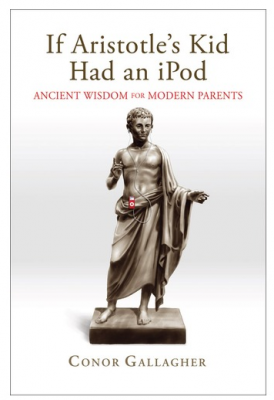Editor’s note: Today, we continue our three-part sharing of excerpts from the wonderful new book If Aristotle’s Kid Had an iPod: Ancient Wisdom for Modern Parents by Conor Gallagher. I hope you enjoy them, and that you’ll strongly consider adding Conor’s awesome new book to your “must read” list. LMH
 If Aristotle's Kid Had an iPod
If Aristotle's Kid Had an iPod
True friendship can exist only between virtuous people. This means that each person is focused entirely on doing good and helping the other become even better.
Furthermore, a true friend must be a positive influence, helping the other to develop further his own virtue. A true friend draws goodness from you in new, creative, and meaningful ways. True friends urge you along the virtuous path, always giving encouragement and helping you when you fall. Aristotle is not an all-or-nothing kind of guy. He understands we all have strengths and weaknesses. And therefore a true friend has certain virtues that you don’t, and vice versa. You help each other.
As a parent, Aristotle would take this point very seriously in selecting his kid’s friends. He would insist that you carefully examine the traits of your kid’s friends. Are they a good influence? Do they draw upon your kid’s good attributes, or do they draw upon his shortcomings? Parents often speak about having to “reprogram” their kids when they come back from a sleepover. There would be less reprogramming if parents were more cautious about who their kids spent time with.
Furthermore, your kid can’t be a good friend to other kids if he’s not developing in his own morality. “You can’t give what you don’t have” is an old adage of the law, and it’s very true. Try to show your kid that friendship is not merely for fun. It is also about sharing the virtues that she has developed with another person…
It takes time to cultivate anything beautiful in this life. You don’t write a book in a month (as I have painfully learned). You don’t paint a picture in a day. You don’t write beautiful music in one sitting. Likewise, you don’t develop a true friendship at a single party. It takes time to learn about the virtues of another, to experience them in action, and to open up to them. Once you have this true friend, it takes time to keep it going. If you lose touch too often, you slip from that deep personal connection. There simply aren’t enough hours in the day to cultivate numerous true friendships.
Aristotle would tell his kid to focus on developing a few true friendships rather than racking up ten thousand Facebook ‘friends.’” (from Chapter 7, “The Three Types of Friendship, pages 86-87)
 About The Author
About The Author
Conor Gallagher earned both his Masters in Philosophy and Juris Doctorate from The Catholic Univeristy of America. He began his professional career as a Law Clerk to the Honorable Robert J. Conrad, Chief Judge of the Western District of North Carolina. He has been an adjunct Professor of Philosophy and Political Philosophy at Belmont Abbey College. He is currently Vice President of Publishing of Saint Benedict Press and TAN Books, and Executive Producer of Catholic Courses. He and his wife Ashley, are the proud parents of eight great children. Conor and his family live in Fort Mill, South Carolina.
About the Author

Guest
We welcome guest contributors who graciously volunteer their writing for our readers. Please support our guest writers by visiting their sites, purchasing their work, and leaving comments to thank them for sharing their gifts here on CatholicMom.com. To inquire about serving as a guest contributor, contact editor@CatholicMom.com.


.png?width=1806&height=731&name=CatholicMom_hcfm_logo1_pos_871c_2728c%20(002).png)
Comments